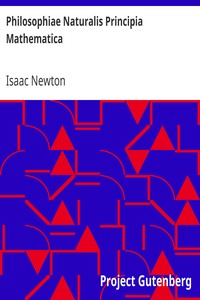Philosophiae Naturalis Principia Mathematica by Isaac Newton
"Philosophiae Naturalis Principia Mathematica" by Isaac Newton is a three-volume work first published in 1687. Written in Latin, it presents Newton's revolutionary laws of motion and universal gravitation, transforming scattered observations into a unified mathematical framework for understanding the physical universe. The work explains planetary motion, tides, comets, and Earth's shape through geometric propositions and empirical investigation. Hailed as perhaps the greatest scientific treatise ever written, it launched modern physics and astronomy,
fundamentally altering humanity's comprehension of nature. (This is an automatically generated summary.)
Read or download for free
| How to read | Url | Size | |||
|---|---|---|---|---|---|
| Read now! | https://www.gutenberg.org/ebooks/28233.html.images | 1.1 MB | |||
| EPUB3 (E-readers incl. Send-to-Kindle) | https://www.gutenberg.org/ebooks/28233.epub3.images | 3.0 MB | |||
| EPUB (older E-readers) | https://www.gutenberg.org/ebooks/28233.epub.images | 2.9 MB | |||
| https://www.gutenberg.org/files/28233/28233-pdf.pdf | 3.8 MB | ||||
| EPUB (no images, older E-readers) | https://www.gutenberg.org/ebooks/28233.epub.noimages | 435 kB | |||
| Kindle | https://www.gutenberg.org/ebooks/28233.kf8.images | 18.5 MB | |||
| older Kindles | https://www.gutenberg.org/ebooks/28233.kindle.images | 18.2 MB | |||
| Plain Text UTF-8 | https://www.gutenberg.org/ebooks/28233.txt.utf-8 | 832 kB | |||
| TeX | https://www.gutenberg.org/files/28233/28233-t/28233-t.tex | 998 kB | |||
| Download HTML (zip) | https://www.gutenberg.org/cache/epub/28233/pg28233-h.zip | 2.9 MB | |||
| There may be more files related to this item. | |||||
Similar Books
About this eBook
| Author | Newton, Isaac, 1642-1727 |
|---|---|
| Title | Philosophiae Naturalis Principia Mathematica |
| Note | Wikipedia page about this book: en.wikipedia.org/wiki/Philosophi%C3%A6_Naturalis_Principia_Mathematica Wikipedia page about this book: sco.wikipedia.org/wiki/Philosophi%C3%A6_Naturalis_Principia_Mathematica |
| Credits |
Produced by Jonathan Ingram, Keith Edkins and the Online Distributed Proofreading Team at www.pgdp.net |
| Reading Level | Reading ease score: 31.9 (College-level). Difficult to read. |
| Language | Latin |
| LoC Class | QA: Science: Mathematics |
| Subject | Mechanics -- Early works to 1800 |
| Subject | Celestial mechanics -- Early works to 1800 |
| Category | Text |
| EBook-No. | 28233 |
| Release Date | Mar 1, 2009 |
| Most Recently Updated | Mar 2, 2009 |
| Copyright Status | Public domain in the USA. |
| Downloads | 3174 downloads in the last 30 days. |
| Project Gutenberg eBooks are always free! | |

